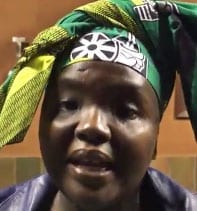

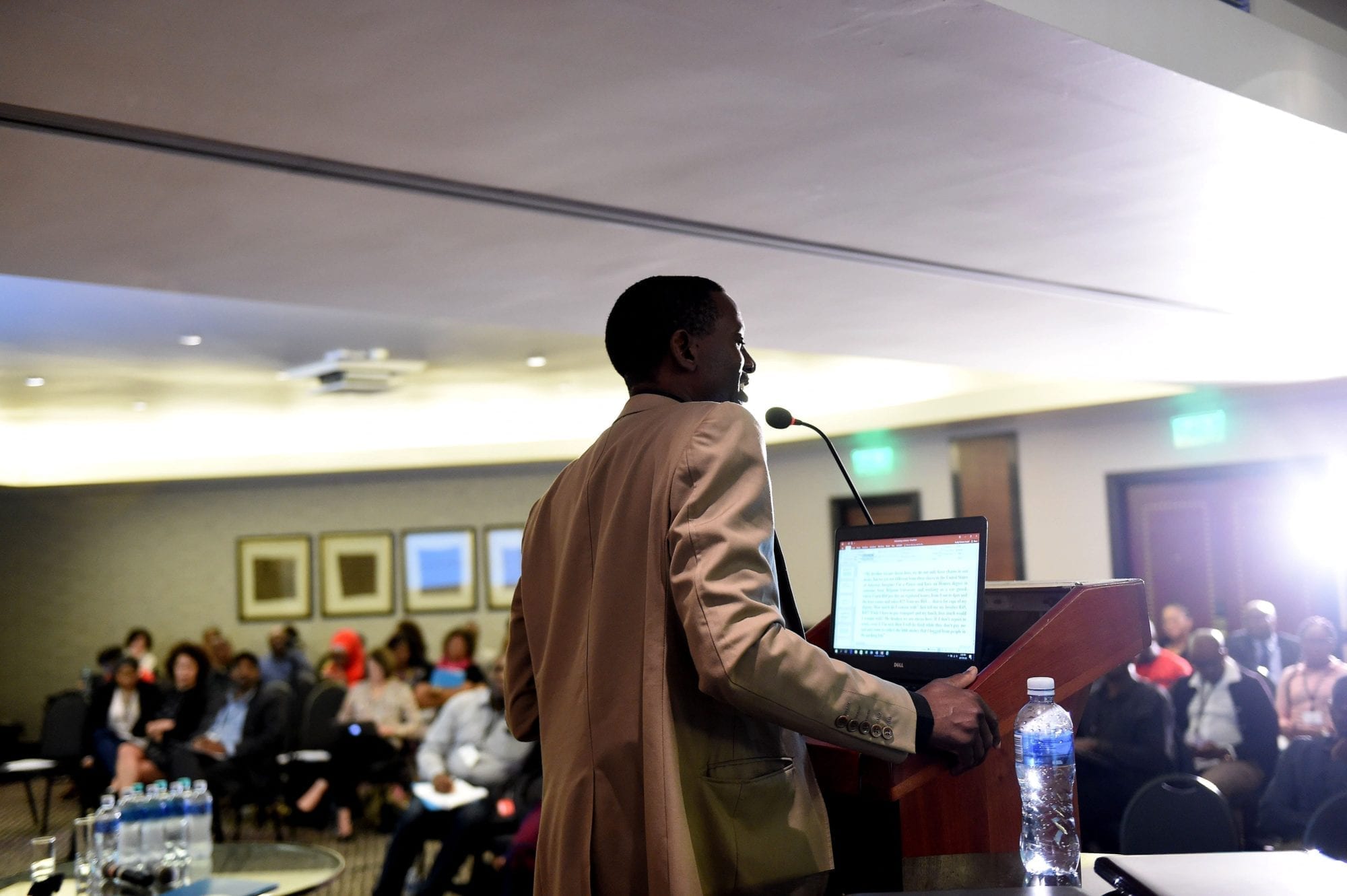
‘Growing Level of Intolerance against Labor Migrants’
Xenophobia and racism are embedded in the daily economic and social situation of labor migrants and refugees, according to Joseph Rudigi Rukema, a sociology professor at the University of KwaZulu-Natal.
“The world is witnessing a growing level of intolerance against foreign labor migrants, refugee and asylum seekers,” he says. Rukema kicked off the afternoon session of the first day at the January 25–27 Solidarity Center Fair Labor Migration conference in Johannesburg, South Africa. (See more conference coverage here.)
The more than 120 conference participants joined in discussions on xenophobia and racism and ended the day by strategizing at break-out sessions on union responses to migration flows and migrant worker exploitation.
Although Rukema focused his presentation on conditions in South Africa, the experiences of migrant workers he described occurs across Africa—and the world.

Unions can play an important role by advocating creation of conducive economic and political condition in migrants’ home countries, says Joseph Rukema.
The exploitation of migrant workers begins with their journey, as labor brokers and others take advantage of their precarious situation, says Rukema. After migrant workers arrive in their destination countries, they “define racism in terms of their working conditions”—such as employer exploitation, he says. Migrant workers also are subject to daily harassment by police and other officials, often inhumane treatment by officials when seeking work permits and lack of access to banking institutions.
“If you look at most of migrants, they flee economic conditions in their home countries,” says Rukema, and unions can play an important role by advocating creation of conducive economic and political condition in migrants’ home countries.
“Build a network with existing institutions and really strong grassroots networks,” he says. (Download Rukema’s full presentation here.)
In the two final break-out sessions, participants discussed the challenges to reaching and empowering migrant workers. They identified such obstacles as the difficulty in reaching informal economy workers, many of whom are migrant workers; xenophobia and suspicion by local residents; and the difficulty in documenting those migrating for work.
Further, union leaders pointed to the need to step up efforts to ensure their governments ratify international conventions, especially the International Labor Organization Convention 143 on migrant workers, and develop comprehensive strategies to ensure migrant workers are represented.
Over the next two days, conference participants will develop concrete proposals to meet the challenges of empowering migrant workers. You can follow the conference on Twitter with the hashtag FairMigration and check out Solidarity Center on Facebook for regular updates.
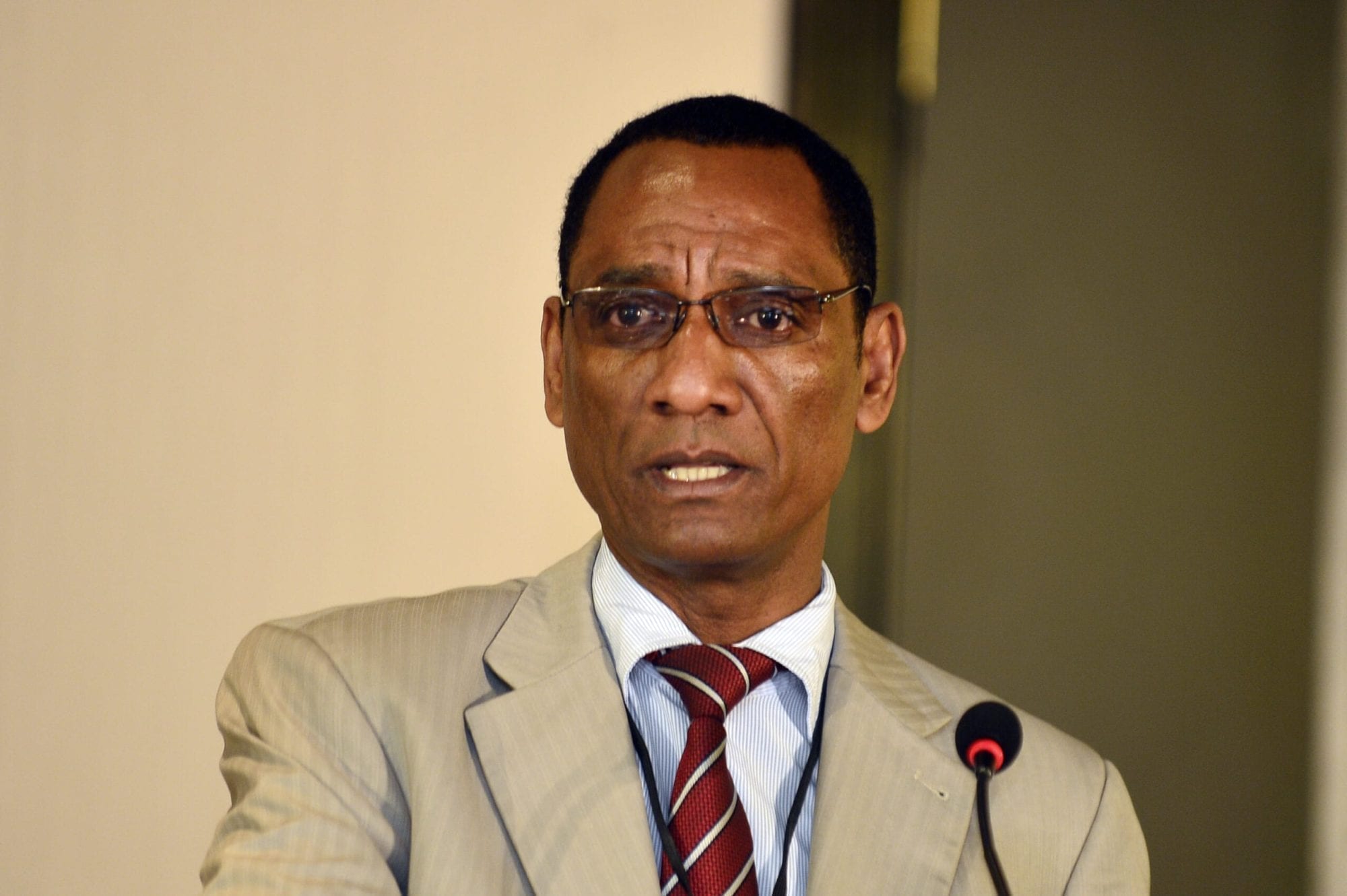
‘Create Decent Work at Home so Labor Migration Is a Choice’
The respect and dignity of labor migrants is under increasing threat, says Kassahun Follo, first vice president, International Trade Union Confederation-Africa, as migrant workers are demonized and denied basic rights, actions driven by exploitation, racism and xenophobia.
Follo spoke this morning at the opening of the January 25–27 Solidarity Center conference, “Achieving Fair Migration: Roles of African Trade Unions and Their Partners” in Johannesburg, South Africa, where more than 120 union leaders, migrant worker rights advocates and top international human rights officials from nearly two dozen countries and 57 organizations are gathering to share strategies for empowering migrant workers and map out plans for changing policies and laws to provide migrant workers fundamental workplace rights.
(Follow the conference on Twitter with the hashtag FairMigration and check out Solidarity Center on Facebook for regular updates.)
Conference Seeks to ‘Put an End to Employer Abuse of Migrant Workers’
The conference’s opening day focused on the feminization of migration, the varied challenges of migration flows at the region=al level in East, Southern and West Africas, and the global threats of xenophobia and discrimination against migrant, included a discussion with migrant domestic workers.
The conference goal, says Peter Hardie, Solidarity Center country program director, is to “create concrete plans, multilateral and bilateral dialogue to drive change to put a permanent end to the abuses of migrant workers by their employers.”
Worldwide, some 150 million people have traveled across borders and are right now migrant workers in another country and send home global remittances totaling $601 billion dollars. In Africa, 34 million workers are migrants — the majority moving across borders to search for decent work. Half of migrant workers are women, who are especially targeted for abuse and exploitation, often due to their marginalization in the informal economy.

“Making sure working people have the right to form trade unions is the heart and soul of our work,” Credit: Solidarity Center/Evidence Holdings
Although labor migration fuels the world economy, it takes place in a global economy set up entirely on the belief that the free movement of capital and profit across borders is desirable, even sacrosanct; and that lack of regulation is what is needed to make this happen.
“Yet there has been no commensurate systemic expansion of the rights of the working people to go along with the incredible expansion of the rights of business. In fact, the opposite has occurred,” says Solidarity Center Executive Director Shawna Bader Blau, speaking during the conference opening plenary.
Bader-Blau urged participants to build national, cross-border and global coalitions to advance human rights in trade agreements and regional economic integration programs, work harder together to end the double standard of investor rights over worker rights and hold governments accountable to the creation of decent work at home “so migration is truly a choice.”
“Making sure working people have the right to form trade unions is the heart and soul of our work,” says Bader-Blau. The conference must look at how unions “make sure migrant workers have these rights.”
Read Bader-Blau’s full speech here.
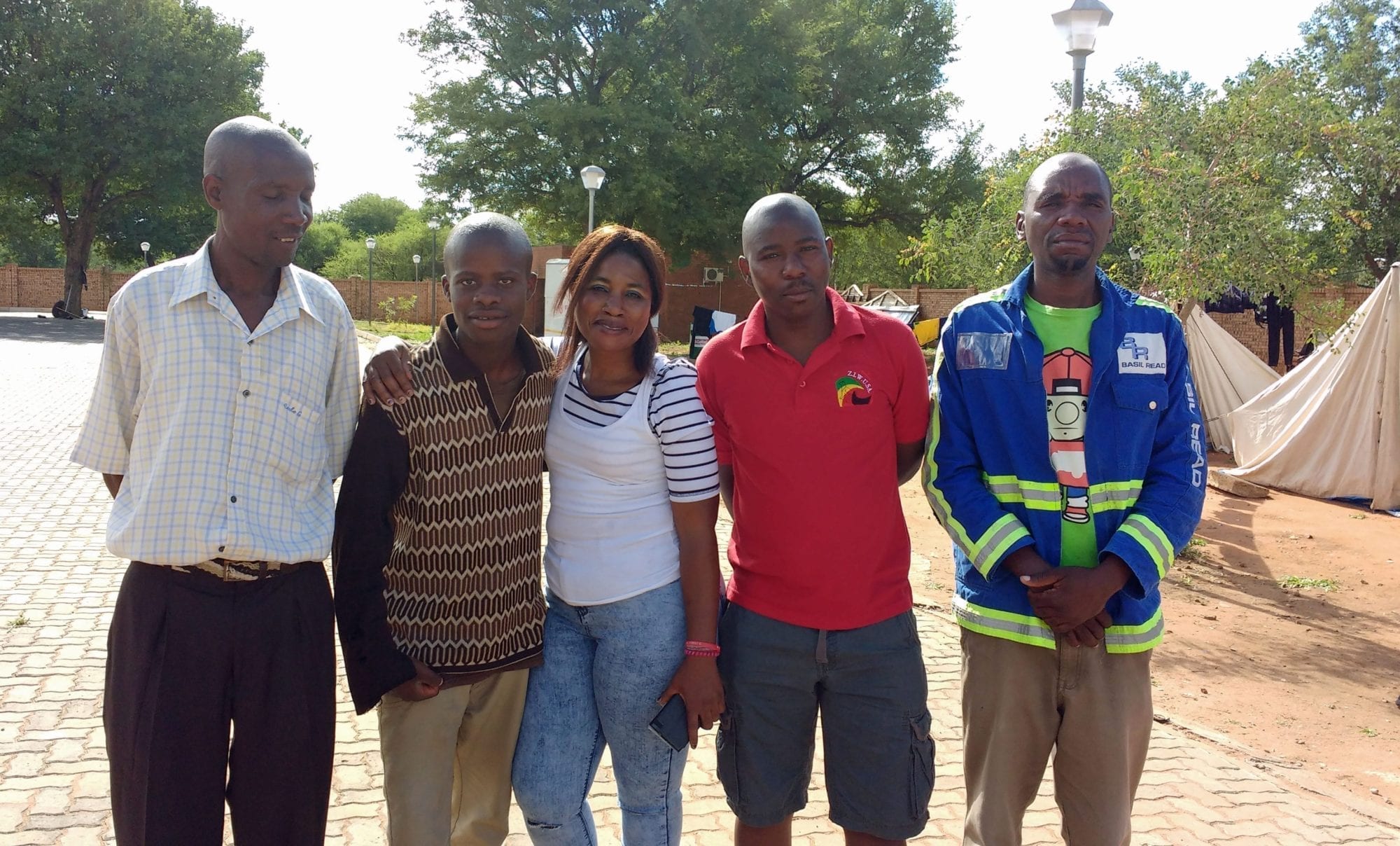
‘Fair Migration’ Conference to Address Worker Exploitation
Edias was 12 years old when he traveled from Zimbabwe to South Africa to look for a job in agriculture. Now in his mid-twenties, he and other farm workers had been working 12 hour days, 7 days a week, and paid less than half the legal minimum wage when they asked the corporate farm owner for a raise last year.
Instead, they were assaulted and clubbed by a group of men led by the farm owner. Their homes—they lived on the farm—were burned. Edias described to Solidarity Center staff how he and four other workers were kidnapped, tortured and interrogated for hours before police arrived. (Find out how the Solidarity Center achieved justice for some of the migrant workers.)
Edias and his co-workers are among 34 million African migrants, the majority of whom are in search of decent work across borders. While an estimated 25 percent of African migrants are in Europe, the majority of migrants remain within the continent, often working in the most dangerous, unregulated jobs where they are paid little and have few rights.
Migration Conference to Address Trade Union Responses to Worker Exploitation
From January 25–27, the Solidarity Center will co-host a conference in Johannesburg, South Africa, that will bring together union leaders, migrant worker rights advocates and top international human rights officials from 22 countries and 57 organizations from around the globe to share strategies for empowering migrant workers throughout Africa.
“Achieving Fair Migration: Roles of African Trade Unions and Their Partners,” will explore best practices for asserting a worker rights agenda into national, regional and global migrant worker policies and examine tactics for strengthening cross-border and cross-regional cooperation among unions and other migrant rights organizations.
Maina Kiai, United Nations Special Rapporteur on the rights to freedom of assembly and of association, will keynote the conference and discuss findings from the landmark report his office presented to the UN last fall. “Migrants have become a massive, disposable, low-wage workforce excluded from remedies or realistic opportunities to bargain collectively for improved wages and working conditions,” according to the report.
Vame Jele, who heads up the Swaziland Migrant Mineworkers Association (SWAMMIWA), will be among some 100 conference participants. SWAMMIWA advocates for migrant workers, especially for migrant miners, truck drivers, forestry workers, domestic workers and farm workers
“Beside networking and establishing partnership with unions, organizations and associations, we aim to learn and share knowledge especially on how we can advocate,” says Jele. He also seeks to raise awareness “and call for solidarity” around the issues of former miners and their families.
Migrant miners who contract silicosis and tuberculosis from working without safety equipment are sent back to their origin countries with no support for medical care. As a result, Jele says, many former miners are dying and their families are in poverty because they have lost their primary breadwinner. SWAMMIWA last month coordinated a policy dialogue around migration issues in Swaziland and advocates to harmonize policies and regulations in the South Africa Development Community (SADC) to abolish inhumane treatment of migrant workers and involve migrant workers in union bargaining.
‘African Unions Can Take a Lead in Shaping Labor Migration Policies’
The prevalence of informal jobs and the lack of recognition of migrant worker’s status “creates opportunities for exploitation and difficulties for unions to organize and represent migrant workers,” says Caroline Mugalla, executive secretary of the East African Trade Union Confederation (EATUC), who also will participate in the conference.
“And as women migrant workers become a larger component of migration, particular challenges arise as they tend to be relegated to the informal economy, face sexual harassment and gender-based violence in the workplace more often than men, and experience nationality and gender-based economic and social discrimination in the workplace.”
The “Fair Labor Migration” conference provides a forum for African trade unionists to coordinate strategies for reaching out to and empowering migrant workers, many of whom are part of the large and growing informal economy. Participants will discuss shaping a trade union agenda against xenophobia and racism, including strategies for tackling discrimination and xenophobia in unionized and non-unionized workplaces; the challenges of organizing and addressing migrant worker exploitation in the informal sector; increasing opportunities for migrant workers to exercise their rights and access justice; and labor protections.
“African trade unions can take a lead in helping shape the global governance of migration and promoting migrant worker rights at all levels of government,” says Solidarity Center Africa Regional Director Imani Countess.
“Government officials, businesses and corporate interests have sought to ‘manage’ the movement of migrants like everyday commodities through temporary migration programs and unregulated migration flows that benefit employers at the expense of workers.” The “Achieving Fair Migration” conference will provide a forum for exploring how to enhance African labor voices in global and regional migration governance policy.
The conference, co-sponsored by the African Regional Organization of the International Trade Union Confederation (ITUC-Africa), will include regional breakouts and opportunity for discussion around area-specific migration issues and hands-on strategic workshops with concrete action plans on union cross-border cooperation, organizing migrant workers and more.
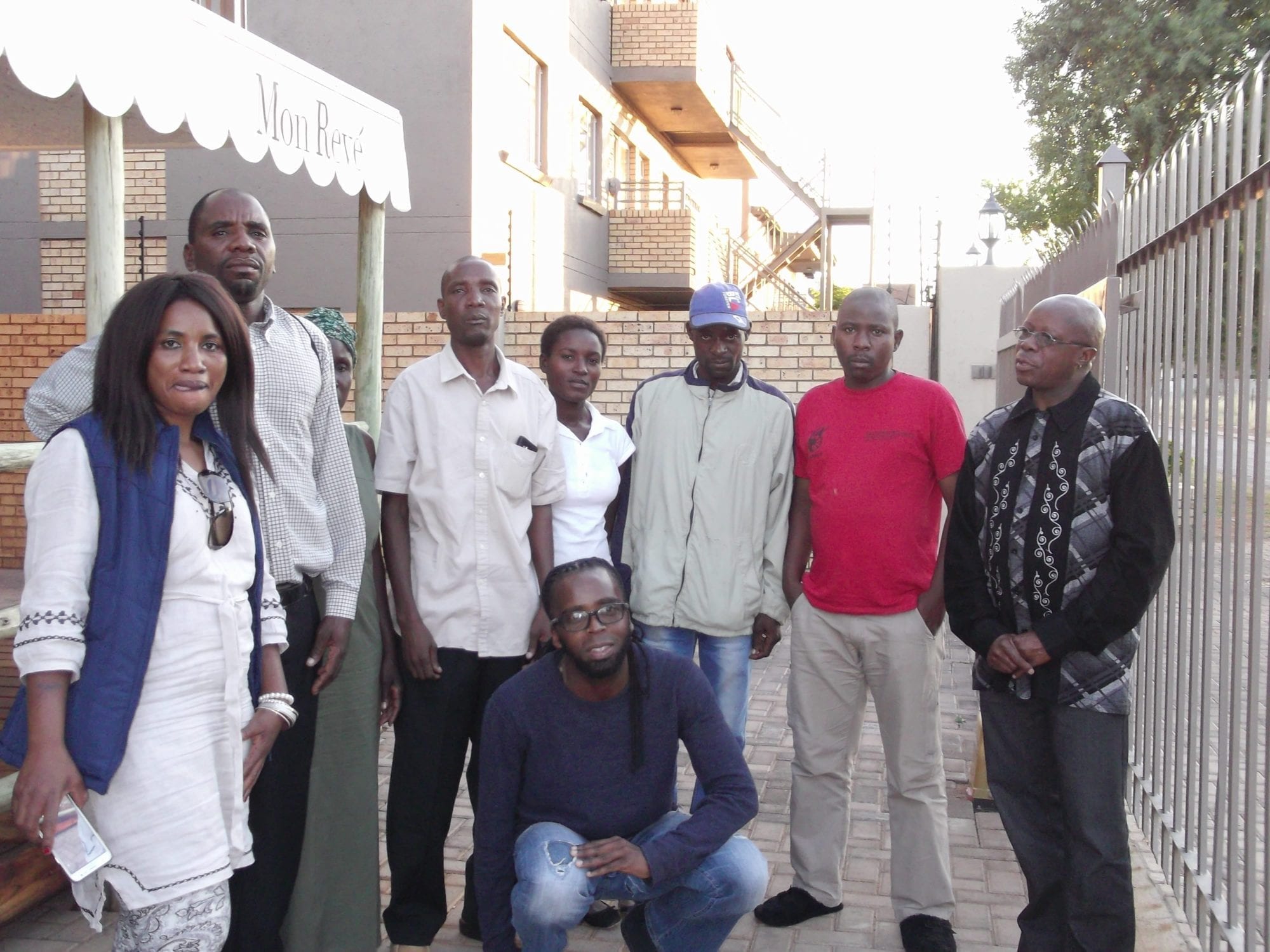
Zimbabwe Migrant Farm Workers See Dawn of Justice
Some of the 245 Zimbabwe migrant farm workers brutalized and evicted last September from a large farm in South Africa, where many had toiled for years, have now been vindicated in court.
In a recent court hearing in South Africa, a judge rejected the farm owner’s argument that the workers were on extended strike and should not be compensated or reinstated. The judge offered the workers back pay or reinstatement, and the seven workers present opted for reinstatement to the farm at the legally determined wage.
The judge indicated he could reinstate only workers who were present, and with the assistance of South African Food and Allied Workers Union (FAWU), the seven workers have begun searching for the other workers.
Zimbabwe Migrant Farm Workers Driven from Their Homes
Last August, the Zimbabwean migrant farm workers, who labored on four vegetable farms operated by Johannesburg Farm, asked for a 59-cent-per-day pay increase. The workers, who were paid $120 month, roughly half the legal minimum wage, regularly put in 12-hour days, seven days a week, and were forced to toil 17-hour days during the harvest.
In September and according to witnesses, a group of men led by the farm owner fired rubber bullets at the workers’ homes, setting some on fire to drive workers out of their houses, where they were assaulted and clubbed. One of the workers, Edias, told Solidarity Center staff that he and four other workers were then kidnapped, tortured and interrogated for hours before police arrived. (For farm workers’ safety, we are using first names only.)
Unable to look for other jobs because the farm owner had confiscated their work papers, Edias and the others traveled to a refugee camp in Lephalale, South Africa, where they arrived in December near starvation.
Criminal Case and Wage Case Pending
Two other cases are pending. One involves a criminal hearing, set for late August, on the kidnapping and torture of the farm workers. South Africa’s Labor Department is leading the second case, which focuses on the issue of wage law violations. The Labor Department has the authority to demand back wages to January 1, 2015—which total more than $100,000—and assess penalties for violating the law.
Along with FAWU and the Migrant Workers’ Union of South Africa (MIWUSA), the Solidarity Center has provided key support to the Zimbabwe migrant workers, enabling them to be represented in court, offering material aid, generating public attention for their plight and raising awareness of the often brutal working conditions of migrant workers across South Africa.
The workers who are returning to the farm say they will post the ruling on minimum wages for farm workers and tell Solidarity Center staff that they feel vindicated—like human beings with standing and rights, according to one worker.

